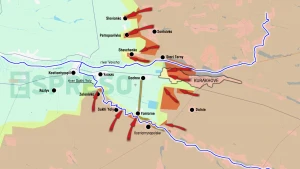
Attack on 13 oil refineries affects Russia's economic and military capabilities. Column by Serhiy Zgurets
On May 1, Ukraine attacked the Ryazan refinery, which is one of the largest in Russia. In total, 13 refineries have been attacked in 9 regions of the Russian Federation. This affects Russia's economic and military capabilities
Ukraine attacks Russia's oil refining complex
On May 1, another 'kamikaze' drone attack was carried out on the Russian oil refining industry. The attack targeted the Ryazan refinery, which is located directly near the city. The direct distance from the Ukrainian border to this refinery is over 450 km. The first explosions, according to eyewitnesses, occurred at 2 a.m. After that, a large-scale fire broke out on the territory of the enterprise. This attack resulted in damage to the primary oil refining facility at the enterprise. The Ukrainian media, citing their own sources, unanimously claimed that this was a special operation by the Defence Intelligence of Ukraine. It is worth recalling that the Ryazan refinery has a declared refining capacity of 17 million tons per year. In fact, this refinery is one of the largest in Russia. By the way, this is not the first attack on this plant. The first one was carried out on March 13. However, it failed to hit the refining tanks. This time, the attack was successful.
A total of 13 Russian oil refineries were attacked in 9 regions of the Russian Federation. This affects Russia's economic and military capabilities. According to Politico, Ukrainian strikes on Russian refineries have already begun to create problems for the Kremlin.
Strengthening Ukraine's air defense
Russia is also stepping up its attacks on Ukrainian targets. That is why the issue of strengthening air defense is becoming extremely relevant today. Against this backdrop, there is interesting information that Israel is decommissioning Patriot systems. In particular, Israel has 4 batteries of Patriot systems. Several news outlets are now reporting that these systems may end up in Ukraine. However, in Israel itself, the media reported comments by officials that these Patriot systems will not be directly transferred to Ukraine. Most likely, the United States will buy these systems from Israel and then transfer them to Ukraine.
It is worth recalling that today Ukraine has three Patriot systems. Political leaders and diplomats say that Ukraine needs seven more such systems. Negotiations are underway on this. In particular, quite recently, the United States tried to convince Greece and Spain to share their Patriot systems. Greece refused, while Spain was ready to provide only missiles for these systems.
Russia is increasing missile production
It is also worth recalling that Patriot systems are the most modern in the Ukrainian Armed Forces today. These systems are used to shoot down missiles for various purposes. In particular, the Defence Intelligence of Ukraine provided data on how many missiles Russia is producing and what types. According to them, the Russians have 40 Zircon missiles and the rate of production of these types of missiles is more than 10 units per month. This is quite high for a new type of weapon. It can be assumed that the Russians plan to use this type of missile from ground launchers. That is why they want to increase the rate of production of Zircon missiles.
Also, according to the Defence Intelligence of Ukraine, the Russians can produce Kh-69 missiles in the amount of 1-3 units per month with a 45-unit stockpile. They have a stockpile of 270 Kalibr cruise missiles, and the production rate is 30-40 missiles per month. We also know that the Russians use the element base of different countries to manufacture all types of missiles. In particular, European countries. However, lately they have been using Chinese components more often. That is why today China has become an important partner for the production of various types of weapons.
Government allocates UAH 15 billion for the purchase of drones for the Armed Forces
On April 30, Ukrainian Prime Minister Denys Shmyhal announced that the government had allocated UAH 15 billion for the purchase of drones for the Armed Forces. This amount was in addition to the UAH 43 billion that had already been allocated for the purchase of drones for the Armed Forces. This is a fairly high amount of money that will be used to produce various types of UAVs. This is an extremely positive trend, but there is one caveat. This 15 billion UAH is not allocated to the Ministry of Defense but to the State Service for Special Communications, which is used by the Ministry of Digital Information to purchase drones. Therefore, it seems that there is some competition in the production of drones. The Ministry of Defense orders drones through its agencies, using the Prozorro approach, where Chinese drones for various purposes are purchased. New drone developments are purchased through the Ministry of Digital Transformation.
In general, when we talk about the purchase of weapons for the needs of the Ukrainian Armed Forces, there is an interesting trend that this year, if we look at the budget of the Ministry of Defense, more than $6 billion has already been allocated for the needs. Despite the fact that the entire budget of the Defense Ministry this year is $40 billion, of which $30 billion is for military salaries, and $10 billion will be allocated for the purchase of fuel, clothing and weapons. However, the entire potential of the Ukrainian defense industry is more than $6 billion. Our companies can produce three times more products. The only question is money.
Cooperation between the military and Ukrainian manufacturers
Pavlo Kyshkar, Head of the MoD Accelerator Project Office, spoke about the technological interaction between the Armed Forces and industry. According to him, such cooperation exists all the time. Ukraine's Armed Forces are in constant contact with Ukrainian manufacturers. Information exchange is ongoing. The military is trying to share information from combat experience to improve developments for the needs of the Armed Forces. In particular, according to him, Ukrainian developers of remote vehicles that can perform various tasks are now several months ahead of our enemy.
Pavlo Kyshkar added that Ukrainian manufacturers are currently concerned about the ban on exports of military and dual-use goods. This often makes it impossible to develop their inventions, as the profitability of their products is limited by the ability of Ukraine's Defense Ministry to purchase various weapons. Kyshkar noted that this state policy is wrong. He believes that Ukraine has every opportunity to enter international markets for military goods. And this should be used during the war. He is convinced that such decisions will only help Ukraine's economy grow.
- News













































